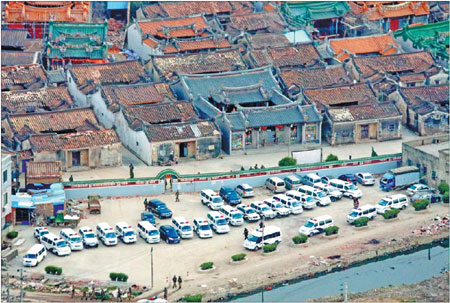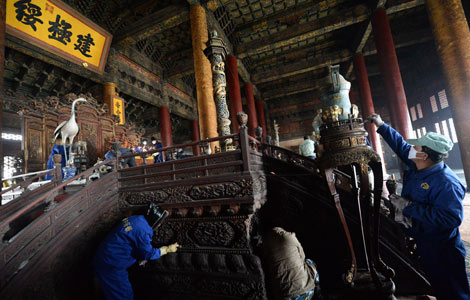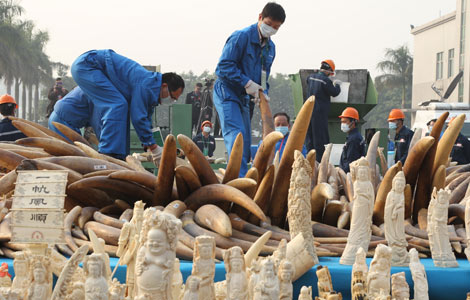How drug base fell to long arm of law
Updated: 2014-01-07 07:37
By Cui jia, He Na, Tang Yue in Beijing and Zheng Caixiong Boshe, Guangdong province (China Daily)
|
||||||||
|
Police vehicles in Boshe, a village in Guangdong province. The authorities seized 3 metric tons of methamphetamine, 23 tons of raw materials, and arrested 182 people. Rong Chuwen / for China Daily |
Easy money led to village becoming an 'ice' production base, report Cui Jia, He Na, Tang Yue in Beijing, and Zheng Caixiong in Boshe, Guangdong province.
In the murky, pre-dawn light early on Dec 29, more than 3,000 officers, including armed police and frontier guards, embarked on the biggest drugs raid in the history of Guangdong province.
Supported by speedboats and helicopters, the raiding party headed for its target - the small coastal village of Boshe, which has gained nationwide notoriety as a center for the production of methamphetamine, usually known as crystal meth, or ice.
The drug has become increasingly popular among young people in urban areas, with a sharp fall in price in recent years increasing its use.
Shenzhen Evening News reported that suppliers were paying 20,000 yuan ($3,300) to 30,000 yuan per kg in the second half of last year.
Police had to be careful though, because the village had been turned into a fortress by residents armed with machine guns and hand grenades who had been making and distributing the drug for decades.
The raid resulted in the seizure of approximately 3 metric tons of the drug and 23 tons of raw materials. In addition, 182 people were arrested, including 14 local Party officials.
More than a week after the officers moved in, a heavy police presence was still visible and the buildings were draped with bright red banners bearing anti-drug slogans.
A family business
Around 20 percent of the families in the village were directly involved in drug-related activities or had a financial interest in the trade, according to Qiu Wei, political commissar of the Narcotics Control Bureau of Guangdong's Public Security Bureau.
With the Party chief acting as the main drug lord and police cars used for transporting the drug, thereby proving an almost cast-iron guarantee of protection, it's little wonder that many of the 14,000 residents also wanted a piece of the action.
A further three police officers are under investigation after allegations that they provided protection for the drug ring, while a drug enforcement officer was removed from his post soon after the raid because of his connections with Cai Dongjia, the former Party chief of the village and primary target of the raid. Cai is now in police custody, and the village committee office was empty on Monday.
For the villagers, all of whom carry the surname "Cai", life has begun to return to normal with shops reopening and construction work resuming. Few locals were willing to discuss the raid
"Production of meth polluted the soil and water in the village. That forced many people to abandon farming and to find other kinds of work," said one local in his 40s, who declined to give his name. "I hope the economy in the village can recover once the drug dealers have all gone."
Local geography conspired to help the gang make the isolated village a production center and fortress. Covering an area of 0.54 square kilometers, Boshe is surrounded by seemingly endless lychee forests to the north, while vast tracts of open farmland stretch out to the east and west. The South China Sea dominates the area to the south.
Most of the 2,026 houses are bungalows, set close together, and, apart from two roads wide enough for vehicle traffic, the village is crisscrossed by winding, narrow dirt tracks accessible only by foot, tricycle or motorcycle.
"Because of the low agricultural yields, the farmers were eager to find a fast, easy way to make money. In the 1990s, smuggling was a serious problem in the village. Low awareness of the law and the lure of easy profits prompted many villagers to turn to the production and sale of drugs," Lin Jiachun, director of the Narcotics Office in Lufeng, told Guangdong-based Yangcheng Evening News.
Most Viewed
Editor's Picks

|

|

|

|

|

|
Today's Top News
Huawei wows Vegas electronics show
Park says ties with China at new high
Economists remain optimistic about Chinese growth
Forbidden City to be closed every Monday
Director questions 3.6m yuan fine
Quality watchdog gives imported food priority
Arrest made in consulate fire in California
Beijing rejects Abe's call
US Weekly

|

|















